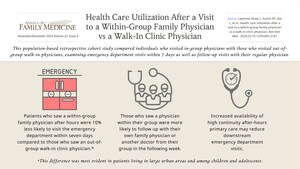Annals of Family Medicine: Psychotherapy and Pharmacotherapy are More Effective in Treating Depression when Paired Together in Primary Care
ANN ARBOR, Mich., May 11, 2021 /PRNewswire/ -- Most patients with depression are treated in primary care, and the majority of those patients prefer psychotherapy over treatment that includes medication (i.e., pharmacotherapy). Primary care physicians, however, are more likely to prescribe antidepressants to their patients suffering from depression.
Although studies have shown the effectiveness of psychotherapy in primary care patients, researchers haven't yet examined the effects of psychotherapy compared with pharmacotherapy, combined treatment, and other clinical scenarios in primary care.
In a study published in the May/June, 2021 issue of Annals of Family Medicine, researchers examined the effects of psychotherapy compared with pharmacotherapy, combined treatment, care-as-usual, waitlist, and pill placebo in primary care patients.
The study is led by Pim Cuijpers, Ph.D., professor of clinical psychology in the Department of Clinical, Neuro and Development Psychology at Vrije Universiteit, The Netherlands, and includes collaborating authors from Japan, Spain, the U.K. and New Zealand.
The team integrated the results of 58 randomized controlled trials involving 9,301 patients. Included studies focused on major depression, persistent mood disorders (dysthymia), or both, as well as studies with patients who ranked high on self-rating depression scales.
In total, the researchers conducted 62 comparisons, including 56 papers about psychotherapy; 19 on the use of pharmacotherapy; five about combined therapies; 39 care as usual papers; six involving patients on a waitlist; and three involving patients receiving pill placebos.
Researchers concluded that both psychotherapy and pharmacotherapy were significantly more effective for depression than care as usual or waitlist control, with no significant difference seen between psychotherapy and pharmacotherapy. Combined treatment, however, particularly in studies that included cognitive behavioral therapy, was better than either pharmacotherapy or psychotherapy alone.
"Although the findings are not unique to primary care, they do indicate that combined treatment has the best effects, and that pharmacotherapy and psychotherapy have comparable effects," the authors write. "Treatments in primary care must be organized so as to accommodate any of these treatments in response to patients' preferences and values."
Psychologic Treatment of Depression Compared With Pharmacotherapy and Combined Treatment in Primary Care: A Network Meta-Analysis
Pim Cuijpers, Ph.D., et al
Vrije Universiteit Amsterdam, Department of Clinical, Neuro and Developmental Psychology; Amsterdam Public Health Research Institute; Vrije Universiteit, Amsterdam, The Netherlands.
SOURCE Annals of Family Medicine

Related Links
WANT YOUR COMPANY'S NEWS FEATURED ON PRNEWSWIRE.COM?
Newsrooms &
Influencers
Digital Media
Outlets
Journalists
Opted In






Share this article